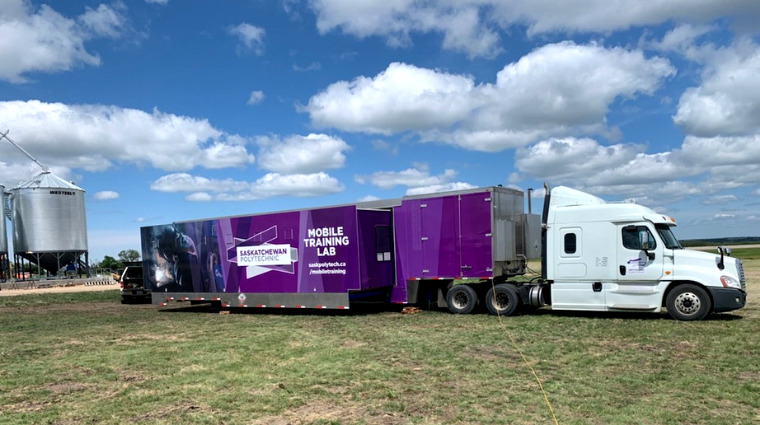
Classrooms have reached beyond their bricks and mortar boundaries, reaching students from La Loche in the northwest to Estevan in the southeast, thanks to three state-of-the-art Saskatchewan Polytechnic mobile training labs.
Since the first mobile training lab was deployed 13 years ago, 31 communities have welcomed them, and hundreds of students have set foot inside as they worked towards careers in the trades, including welding, electrician, machinist and industrial mechanics. Today, three mobile training labs bring a variety of trades training to rural and remote communities across Saskatchewan.
Dan Duperreault, associate dean of the School of Transportation and School of Construction, says the impact today aligns with the original vision for the training labs. “Thirteen years ago, our dean at the time had a vision of bringing training to communities versus the community members coming into our metropolitan centres. Right from the get-go, the intention was bringing training to remote locations.”
The labs provide 1,100 square feet of space and can accommodate up to 12 students. Each lab is outfitted with advanced equipment, tools and training aids and can be set up as a classroom or workshop, depending on program requirements.
The labs make training more accessible for students who are unable to move to urban centres and they increase the participation of Indigenous students. The participating communities and their local industries also reap the benefits, says Duperreault.
“Quite often the students who come to the city for training might not go back home to work. A lot of the small communities struggle to find people to work because the students often want to move to the city. When they’re trained at home, and able to stay at home, they’re more likely to stay there after they complete their training.”
Local industry also benefits because employers don’t have to send their employees away for training—they can continue working in their chosen trade and upgrade their skills through evening or weekend classes.
“We’re not displacing students,” says Duperreault. “We’re not asking them to start paying rent for weeks or months at a time in a community they’re not familiar with. They get to stay at home with their families and learn right there.”
Sask Polytech partners with regional colleges and the Saskatchewan Indian Institute of Technologies (SIIT) to expand the impact of trades training outside of urban centres. “We have requests from regional colleges to run programs like industrial mechanics and welding, so the mobile training labs would go to a location for 17 weeks and when the program ends, we call it back home or send it to a second location for the second half of the year,” says Duperreault.
One unique partnership with SIIT stands out in Duperreault’s mind. An instructor from SIIT wanted to bring an introductory to trades program to five different northern communities in 10 weeks, so one of the labs was dispatched. “It had high school students (training) during the day and community members training at night. It was a huge success.”
One of the labs will be on the road again this July, when it makes a pit stop at Ag in Motion—Western Canada’s largest agricultural trade show, held outside Saskatoon. It will be used for student recruitment, showcasing six of Sask Polytech’s trade programs.
Welding and auto body (painting) VR simulators on board will allow visitors to test drive a new trade—and perhaps fuel some interest in a career that will lead them back to one such mobile training lab.

